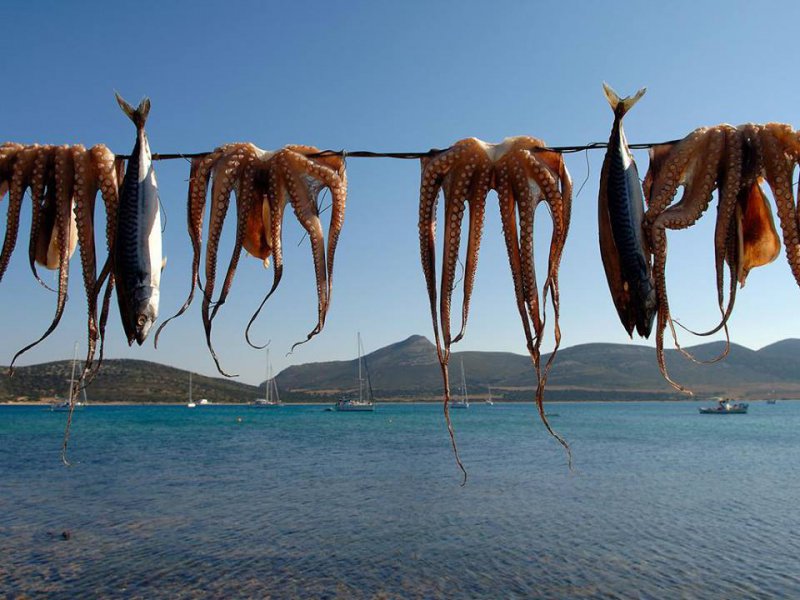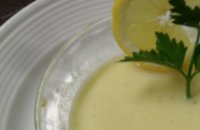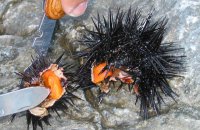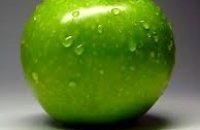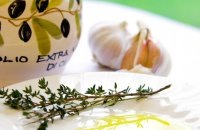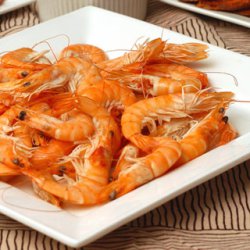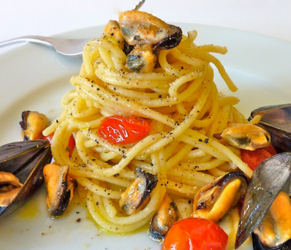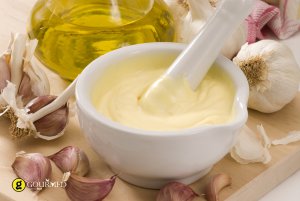In the summertime, the seafood dishes served in Greek tavernas are almost always to die for.
Anyone who has traveled to Greece during the summer will surely have noticed octopus drying in the sun, usually hanging from the rafters of the tavernas. It used to be that octopus was culled almost exclusively from local waters, but alas, the Aegean hasn’t much of a fresh catch left. Most of the octopus in Greek tavernas are, in fact, from abroad.
To know a fresh octopus, one has to recognize it first by its color—deep glossy purple-black. If one stands witness to a just-caught octopus, then surely the rock-beating habits of macho Greek fishermen will have made a lasting impression. Tradition has it that it must be rapped a biblical 40 times against a rock in order to soften its tough, leathery flesh. Modern-day fishermen flash freeze it (the freezer breaks down cell structure, too, making the octopus tender) or spin it in a dry washing-machine-like contraption that simulates the hand beating.
Fresh octopus is invariably tougher than frozen, but also tastier. While fresh octopus seldom, if ever, needs salt in any of its preparations, frozen octopus is a great unknown in terms of its savoriness. Sometimes frozen octopus will be just as delectable as that which is fresh, while other times it will be so tasteless that it is nearly unbearable to eat.
In Greece, there are various methods for cooking an octopus, no matter what its final destination might be (meaning, whether the meat is intended for a stew, for example, or to be cooked on the grill). It is almost always cooked first before one does anything else with it. A restaurant chef will probably tell you that the best way to prepare an octopus is to braise it in the oven with wine, olive oil, bay leaf, and other herbs, and then to use it as desired- braised further in any of the numerous stews that call for it, or grilled, among other options.
Others poach their octopus in a great deal of red wine and olive oil, while still others rely instead on the octopus’ own juices. Try cooking it in a dry pot, covered, and over very low heat, until it exudes its "sea" of dark pink juices. Depending on size, it takes anywhere between 30 minutes and an hour for this preliminary tenderizing.
One must, of course, take care to have cleaned it beforehand, which is easy: Just cut off the hood (if you want to cook this, too, invert it and wash out all the viscera on the inside), and then cut the octopus close to its stumpy base. Squeeze out the little black beak and cartilage, and voila!- your octopus is ready for the cooking pot. Always cook it whole then cut it, lest it shrink too much and dry out.
Squid and cuttlefish are two other Greek favorites, during Lent and at most other times of the year, too. Both need to be washed well, usually under running water. First remove the tentacles and discard the long, string-like tentacles. Then, with the water running, scoop out the viscera and remove and discard the hard piece of cartilage. In the case of the cuttlefish, which is larger and tougher, you may have to use a knife to remove it.
Both squid and cuttlefish can benefit from either of two extremely contradictory cooking methods: They require either very little cooking (i.e. for no more than two or three minutes on a grill or in a hot sauté pan), or very much cooking (for say at least an hour to hour and a half), if the dish in question is a stew. Anything in between will render the squid and cuttlefish rubbery and tough.
The fresh-frozen issue is iffy, here, too. Most of what we find at the market is, in fact, frozen. Frozen squid has considerably less taste than fresh, and it’s worth seeking out a reputable fishmonger who can ensure that what he’s proffering is, indeed, fresh. Ditto for the cuttlefish, which seldom comes complete with its mysterious ink because the fragile ink sacs get crushed in the packing.
Greek fishmongers, like the country’s ill-tempered taxi drivers, are often times less-than-credible professionals. They’ll tell you anything and everything is fresh, even as their products start releasing rancid odors. It’s important to know the difference between a fish that has recently been pulled from the emerald waters and one that has been shipped frozen from Africa, defrosted, and then sprayed with water only moments ago in an effort to make it appear fresh.
All cephalopods benefit from various types of cooking. Octopus is especially delicious on the grill, but so is large squid and cuttlefish. All three are also delicious in the stew pot, with wine and/or tomatoes, herbs, greens, potatoes and more. Octopus and squid also are excellent in seafood salads, whereas the larger cuttlefish is a little too tough for the salad bowl.
How to Cook Greek Seafood
Octopus, the Greek way.
Tips
Octopuses are often caught by spearfishing close to the Aegean shores during nights with full moon.
Country:
Category:















































